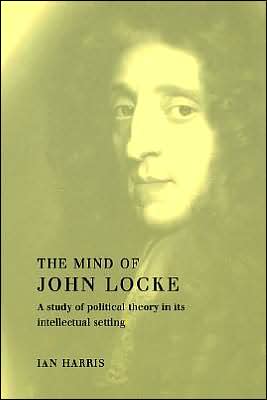

 |

|

The average rating for The Mind of John Locke: A Study of Political Theory in Its Intellectual Setting based on 2 reviews is 4.5 stars.
Review # 1 was written on 2014-12-23 00:00:00 William Gibson William GibsonDecent by Default: Before briefly stating my opinions on the book, let me mention that amazon reviews, capped at 1,000 words, do not provide an optimal forum for in-depth reviews. My review has been criticized as "non-sensical" by the other reviewer on this site who posted from New York. Within the next several days I will put up a website which contains a much longer review of this book. Not only will I show that my claims are not non-sensical, I will also attempt to get it into the other reviewer's tiny mind just how the book fails. The author himself, upset at the amazon review, sent me a letter, to which I will respond in depth on the aforementioned website. If you are interested in understanding Badiou (indirectly) or how Hallward's book lacks significant philosophical worth, look for this upcoming website. For now: Though indisputably erudite, Hallward's book is not only confusing but confused. The first four chapters seek to situate Badiou in the context of classical philosophy and current French thought, and to clarify the role of mathematics in Badiou's philosophy. The attempt to contextualize Badiou fails horribly. We find out, in particular, that Badiou aligns himself with Plato, Descartes, Sartre, etc; we find out that he rejects the linguistic turn. We find out that he is the "exact contrary" of Heidegger, but it is never explained how or why this is so. In other words, all we get is a cataloguing of Badiou's positions (as if he were a politician) without the argumentation that Badiou uses to ally himself with these positions. The majority of what we get by way of argument-reproduction is the trite phraseology that Badiou cares for strong subjectivity, clarity, universalism, etc. Ok. But why? And how does he defeat the linguistic turn? Why is thought before being? The explanations clarifying Badiou's equating of mathematics and ontology fail abysmally through internal contradictions. The author fails at points to keep "pure being" and "what can be said of being" distinct; at one page he will call mathematics "true thought", and at another time he will say that it is valueless--it is the event which is true thought. We do not get a clear sense what the precise connection between mathematics and reality is for Badiou: at one point Hallward says that, for Badiou, mathematics as articulating Being implies that it is "prior to" the distinction between the actual and the potential; while at other moments he attempts to understand Badiou as a partial realist and partial formalist (these terms, or at least realism, presuppose the strong divide between reality and mathematics which Badiou seeks to overcome). It is of course possible to make arguments which resolve these tensions in Hallward's text. But the book makes the reader work too hard to thread something coherent from the mess that is presented. It is only through attentive reading that these gaps and contradictions come out. A cursory reading will leave one very satisfied. But if you want to understand Badiou deeply, this book reads roughly. Unfortunately, there are few other books on the market which cover the range of Badiou that Hallward does. So i'd have to say that it is decent by default. |
Review # 2 was written on 2013-05-24 00:00:00 Vaughn Ford Vaughn FordVery clear and cogent summary of Badiou's theoretical system, especially in Part 2. From Badiou's early admiration of Maoism to his underground political engagements, this book covers the ambitious nature of Badiou's philosophy. One point that I particularly appreciate is that the author suggests inadequacies in Badiou's formulations, e.g. Badiou is unwilling to grant relations their proper ontological status. He also tries his best to avoid the nested mathematical jargon that Badiou indulges in Being and Event, and gives equal emphasis on Badiou's non-mathematical explorations. Would read again. |
CAN'T FIND WHAT YOU'RE LOOKING FOR? CLICK HERE!!!